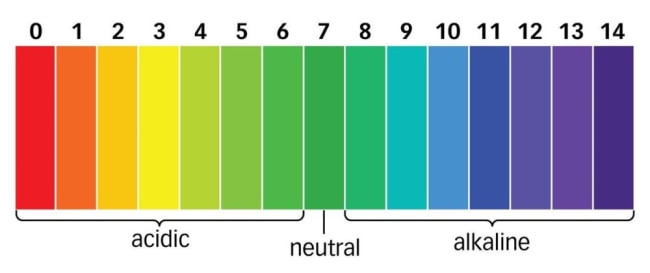Measuring pH with an Arduino and pH sensor – Arduino Tutorial

Want to measure how acidic/basic your water is with the Arduino? With this guide you will learn about our new Grove – PH Sensor Kit to easily do just that. This Arduino Tutorial will cover:
- What is pH?
- Is pH important?
- About the Grove – pH Sensor Kit
- Applications of Grove -pH Sensor Kit
- Related Sensors
What is pH?
Basically pH is a measure of how acidic or basic a liquid is with the range from 0 to 14. The measurement of less than 7 indicates that the liquid is acidic, 7 being neutral while a measurement greater than 7 indicates that the liquid is a base.

Each number represents a 10 times change in the acidity or basicness of the water. For example, the liquid that has a pH of 5 is 10 times more acidic than the liquid with a pH of 6.
pH measurements are done by measuring the relative amount of free hydrogen and hydroxyl ions in the liquid.
- If a liquid has more free hydrogen ions = Acidic
- If a liquid has more free hydroxyl ions – Base
Is pH important?
Yes, by knowing the level of pH in your liquid, you can obtain various important information about it.
By knowing the pH of your liquid, you can find out about its solubility and biological availability (the amount that can be utilized by aquatic life) of chemical components in your water such as nutrients like phosphorus, nitrogen, and also heavy metals. If you have an aquarium the pH level of your water is important as when your water has a too low or too high pH level, it can be harmful to your fishes and other aquatic life.
For example, at low pH toxic metals such as aluminum can enter the water in high concentration and some nitrogen-bearing chemicals become more toxic making the metabolic processes of fish become less efficient which can inhibit reproduction and even cause death. At high pH levels, ammonium in your liquid is converted to ammonia which is toxic to fish causing death as well.
pH levels in your drinking water is important as well as low pH drinking water can cause your pipes to degrade and cause toxic metals such as copper and lead to enter your water supply. High pH levels in your drinking water can also lead to an unpleasant taste.
About the Grove – pH Sensor Kit

Looking for a low-cost pH meter? Or one that you can use easily with your Arduino and the Raspberry Pi? With this low-cost Grove-pH Sensor kit, you can easily connect a pH meter and start measuring pH in your water! By measuring the hydrogen-ion activity in water-based solutions, this sensor gets a pH reading.
For makers and hobbyists looking to create a project regarding pH, this sensor kit will be perfect for you with its wide accuracy range. Even better, this sensor is much cheaper than other pH meters at only $15.90!
Specifications
| Items | Values |
|---|---|
| Operating voltage | 3.3V/5V |
| Range | 0-14PH |
| Resolution | ±0.15PH(STP) |
| Response time | <1min |
| Probe Interface | BNC |
| Measure temperature | 0-60℃ |
| Internal resistance | ≤250MΩ(25℃) |
| Alkali error | 0.2PH(1mol/L)Na+,PH14)(25℃) |
Here is video where we demonstrate using the Grove pH sensor kit to read pH levels of liquids!
Applications of Grove -pH Sensor Kit
With the pH sensor, there are many uses and projects you can do with it from:
- Water quality monitoring (For your fish tank or Swimming Pool)
- Water and Wastewater treatment gadget
- Agricultural and Aquaculture processes
Related Sensors
Looking for other sensors? No worries as Seeed has a variety of water sensors just for you! Here are a few that you might like:
Grove – ORP Sensor Kit (501Z)

Want to measure the ability of a lake or river to cleanse itself or break down waste products? With this ORP sensor, it will measure the activity of oxidizers and reducers in an aqueous solution. For example, you can use the ORP Sensor to measure the oxidizing ability of chlorine in swimming pools or to determine when the equivalence point has been reached in an oxidation-reduction reaction.
Similar to the pH sensor, the Grove connector and BNC probe interface making it easy to use and very suitable for your Arduino and Raspberry Pi project.
Grove – EC Sensor Kit

Wish to measure electrical conductivity of your liquid? This EC sensor does just that. The EC sensor has multiple applications from hydroponics, aquaculture, aquaponics, to freshwater systems. The EC sensor allows you to monitor the number of nutrients, salts or impurities in your liquid.
Best of all, this EC sensor only costs $29.90 which is much cheaper than many other alternatives while having a relatively high accuracy which can cover most applications.
Grove – TDS Sensor/Meter For Water Quality (Total Dissolved Solids)

TDS which stands for total dissolved solids are often found in water as water is a good solvent that picks up impurities easily. With this sensor, you can find out any inorganic and organic minerals, salts, metals, cations (eg. calcium, magnesium, potassium, sodium) or anions (eg. carbonates, nitrates, bicarbonates, chlorides) dissolved in your water.
To find out more about this sensor and TDS, you can check out our guide over here!